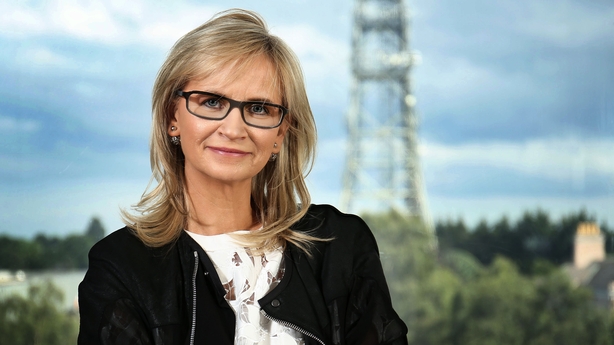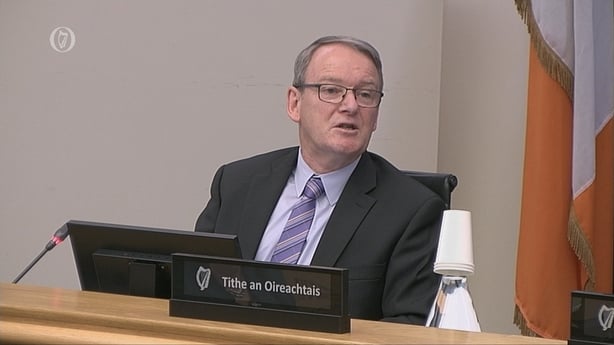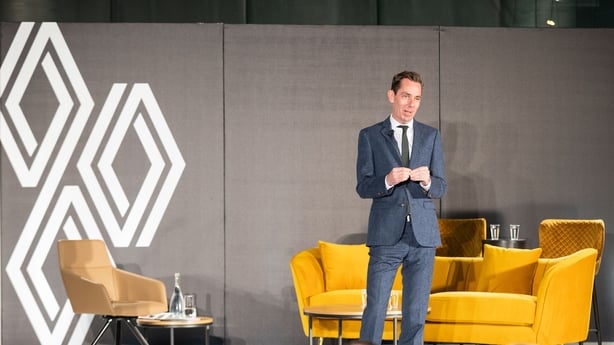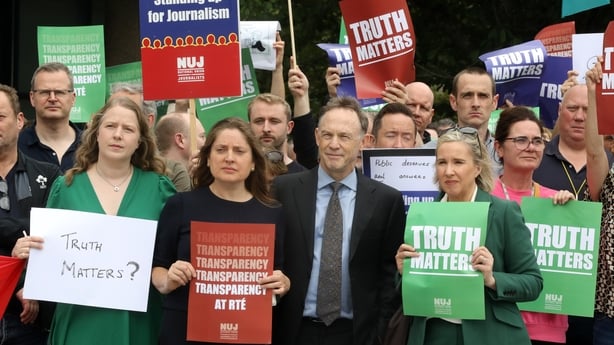In March, Ryan Tubridy announced he would not be presenting the Late Late Show once the current season finished in May.
Around the same time, auditors were raising concerns about transparency relating to payments which had been made to him in the recent past.
Ryan Tubridy says the two issues are not related but the auditors' concerns have resulted in massive questions about his future in RTÉ, and about the future of RTÉ.
Members of the RTÉ Board along with senior managers from the Executive Board are preparing to appear before Oireachtas Committees. On Tuesday evening, the Interim Deputy Director General, Adrian Lynch released what is described as a 'comprehensive statement’ on the matter.
So, how did we get here, what do we know now? And what questions are likely to be raised at those forthcoming Oireachtas Committees?
The controversy emerged last Thursday afternoon, when the board of RTÉ released a statement.
"It is with profound regret that I inform you of this serious breach of trust with the public," wrote Siún Ní Raghallaigh, chair of the board.
"The matter in question concerns payments made to presenter Ryan Tubridy."
Running to 1,300 words, the statement detailed that RTÉ had understated Mr Tubridy’s remuneration by €345,000 between 2017 and early 2023.
A table compared the numbers RTÉ had published previously for Mr Tubridy’s annual earnings with what Mr Tubridy actually earned.
It showed that not only were the published numbers wrong for each year but the trend that RTÉ portrayed was wrong too. In contrast to RTÉ’s prior public statements about reductions in the money paid to him, it seems Ryan Tubridy earned more in 2022 than in 2017.
The statement delineated between payments made before and after 2020. Auditors had raised issues with how €150,000 of the money paid for the years after 2020 was processed through a barter account.
Explainer: What are barter account transactions?
The board noted that due to how the accounts operate, it had cost RTÉ €230,670 to pay €150,000 to Mr Tubridy.
Circumstances surrounding the €120,000 paid for the period 2017 to 2019 were under examination, the statement said. They remain under investigation now.
The revelations immediately provoked anger from the public and RTÉ staff. Radio phone lines lit up and political reaction flooded in.
During the period covered, RTÉ had been seeking licence fee increases and cutting costs and jobs to deal with what was called an "existential financial crisis."
It was even claiming pandemic subsidies from the Department of Social Protection to cover staff wages.
At the same time, senior managers - most prominently Director General Dee Forbes - were emphasising publicly how top earners in the organisation were taking their share of the cut cutting measures.
They had underlined to politicians and media how transparent RTÉ was being by regularly publishing a list of the top ten earning presenters.

Now, it was clear the figures for the man who topped that list were seriously misreported.
Politicians, staff, and the public demanded answers.
In the hours that followed on Thursday, Ryan Tubridy released his own statement, saying he "can't shed any light" on the payments.
"It is unfortunate that these errors are in relation to how RTÉ have reported payments made to me but I just want to be clear: this is a matter for RTÉ and I have no involvement in RTÉ’s internal accounting treatment or RTÉ’s public declarations in connection with such payments."
24 hours later he issued another one.
"I should have asked questions at the time and sought answers as to the circumstances which resulted in incorrect figures being published. I didn’t, and I bear responsibility for my failure to do so. For this, I apologise unreservedly."
"I am disappointed that RTÉ has decided that for editorial reasons I should not broadcast my radio show next week," he added.
As yet, it’s unclear if or when he may return to the air waves.

In the time between the two statements from Mr Tubridy, the controversy had been moving fast.
It was confirmed by RTÉ on Friday morning following media queries that Dee Forbes had been suspended by the board of RTÉ on Wednesday from her position as Director General.
The Minister for Communications Catherine Martin had called the chair of the RTÉ Board to a meeting.
Initially scheduled for Monday, it was soon brought forward to Saturday afternoon.
Leaving the meeting that day, the minister said public trust in RTÉ now needed to be rebuilt and announced an external review into governance of the organisation.
Two Oireachtas committees were calling for RTÉ managers, specifically Director General Dee Forbes, and board members to appear before them.
"What has happened is utterly unacceptable" said Brian Stanley, the Sinn Féin TD who chairs the Public Accounts Committee. "There must be accountability," he added.

Across the country's newsrooms, journalists with weekend deadlines were working to add to what was known.
Each of the Sunday broadsheet papers and many of the tabloids led on the growing scandal. It also featured highly across broadcast news bulletins.
The central question for many reporters was 'who knew about these payments and why were they not disclosed by RTÉ or Mr Tubridy?’
The Sunday Independent, Business Post and Sunday Times all added detail to what was known about the controversy, and raised further questions.
In particular, the Sunday Times published specific information about how the payments for the period after 2020 went through the barter account and were processed and considered within RTÉ.
On Monday morning, Dee Forbes released her first statement on the matter.
"I am the person ultimately accountable for what happens within the organisation and I take that responsibility seriously," she said. "I am tendering my resignation to RTÉ with immediate effect."
Hired as director general in 2016, she said she led discussions in 2020 with Ryan Tubridy’s agent Noel Kelly "along with other senior executives," she said, on the renewal of his contract with RTÉ.
"That contract contained contractual payments that had been negotiated and put in place prior to my arrival at RTÉ."
Her statement provided her perspective on why Mr Tubridy received payments through the RTÉ barter account from 2020 onwards.
It did not address why such payments were not disclosed to the public, Oireachtas, or the board of RTÉ.
The arrangement agreed as part of the contract renewal negotiations in 2020 involved three parties, RTÉ, Ryan Tubridy and Renault.
It saw RTÉ reduce the cost to Renault of the sponsorship of the Late Late Show by €75,000. In exchange, Renault agreed to pay Mr Tubridy €75,000, while Mr Tubridy agreed to make several personal appearances for the sponsor.
In short, RTÉ signed an agreement to reduce its income and increase the value of Mr Tubridy’s income by the same amount.

Not only that, but RTÉ had additionally legally guaranteed the payment would be made to Mr Tubridy in the event Renault withdrew from the arrangement.
The controversy centred on RTÉ and Mr Tubridy.
With Ryan Tubridy apologising for not asking more questions, and noting he had no involvement in RTÉ's accounting practices, Dee Forbes’s statement further clarified how the payments had come to pass.
On concluding the deal, Renault had ensured for commercial reasons that it had an option to withdraw after one year. To it, the deal was cost neutral - it just paid €75,000 to Mr Tubridy instead of to RTÉ.
There is no suggestion of any wrong-doing on the part of Renault.
It made one €75,000 payment to Mr Tubridy but decided not to renew the contract when the pandemic struck.
As the money was supposed to come from Renault, "RTÉ had never expected to become liable for them [the €75,000 annual payments] and had not budgeted for them," Dee Forbes said in her resignation statement.
"Because of the commercial nature of the arrangement, it was decided to pay the invoices from the commercial barter account which was in credit. We were motivated purely by the need to find a solution to honour the contractual obligation."
Statements from the RTÉ board had previously noted that the barter account was not controlled by the finance function of RTÉ.
The Board said the first it learned about the arrangement made at executive management level with Mr Tubridy was when auditors flagged concerns in March.
At that point, the Board commissioned forensic accountant from Grant Thornton to investigate further, which resulted in the discovery of the €120,000 pre-2020 payments, about which almost nothing still remains known.
That Grant Thornton report on post-2020 payments was presented to board members on Monday 19 June. Three days later, the statement was released which exposed the existence of the payments to Mr Tubridy.
Following the weekend’s news coverage and political criticism, demands for appearances at Oireachtas Committees and public anger, RTÉ released "as much as possible of the Grant Thornton review" on Tuesday.
In the hours beforehand, a spokesperson for Dee Forbes confirmed she would not be appearing before a meeting of the Oireachtas Media Committee planned for Wednesday, due to ill health.
Minister Catherine Martin said the terms of reference for the external review into RTÉ was being finalised, and the process was likely to take around six months to complete.
"The public wants to know who signed off on the payments, who else was involved or aware of these transactions," she said.
Asked about Mr Tubridy’s future in RTÉ, she said it was not her role to comment on it.

Around the same time, RTÉ staff and journalists held a protest on the grounds to underline their anger about what had been exposed.
Per her own resignation statement, Dee Forbes was centrally involved in concluding the agreement with Mr Tubridy, via his agent.
She said it followed detailed discussions "including numerous internal communications over many months with RTÉ colleagues, including finance and legal colleagues."
On Tuesday, RTÉ released a redacted version of the Grant Thornton report and a detailed statement from the deputy director general, Adrian Lynch.
They added detail to exactly who knew what about the arrangement agreed, and just how much the arrangement actually cost RTÉ.
It says during negotiations on the renewal of Ryan Tubridy's contract in 2020 the then Chief Financial Officer was aware of - and referenced - plans to facilitate "a possible additional commercial agreement (what later became the 'Tri-Partite Agreement’) to the value of €75,000 per contract year."
The Grant Thornton reports states that RTÉ was keen to make a cost saving in respect of the "end of contract payment" due to Mr Tubridy and that this arrangement was negotiated and in place prior to the Director General’s arrival.
The Chief Financial Officer who was in place at the time left the organisation in 2020.
"The ‘Tri-partite Agreement’ between the commercial partner, the Agent and RTÉ was arranged by the Commercial Director at the direction of the Director General," the statement adds.
The statement also noted that Dee Forbes has not has an opportunity to respond to the account supplied by RTÉ and "may therefore challenge or disagree with our understanding and position."
On how the arrangement came to be underwritten by RTÉ the statement says, the director general and an RTÉ solicitor held a meeting on Microsoft Teams in May 2020 with two representatives of Ryan Tubridy’s agent.
There "the RTÉ Director General supported in the meeting by an RTÉ solicitor [provided] verbal guarantee that RTÉ would underwrite the commercial agreement."
The statement adds that "This final aspect had been sought by the Agent throughout the negotiations and there had been significant push back by RTÉ."
In relation to how the money came to be paid through the barter account, it says "other than the Director General and the Commercial Director no member of the Executive Board had knowledge of... the payment of those invoices through the barter account."
On this matter, the Commercial Director is referenced as telling RTÉ "her knowledge of those matters was limited to the instructions received by her from the Director General in connection with the payments in question."
The Commercial Director noted in the same statement: "While it was still at draft stage, the arrangement was approved by the Director General. It was ultimately implemented by means of a credit note, issued on the direction of the Director General."
The nine-page report also provides a timeline of the payments made after 2020, and details how the statement on RTÉ’s top earners is compiled.
It says: "No member of the RTÉ Executive Board, other than the Director General, had all the necessary information in order to understand that the publicly declared figures for Ryan Tubridy could have been wrong."
The Grant Thornton review makes no finding of wrongdoing on the part of Ryan Tubridy in relation to any payments made by RTÉ.
It finds that, further to the money already known about in the recent controversy, RTÉ also paid the costs of hosting the commercial sponsor events in 2022.
The cost of the events was €30,586. As the payment was made through a barter account, the cost to RTÉ was recorded at €47,477.
In response to queries on Tuesday evening RTÉ said that it will be represented at tomorrow's engagement with the Joint Oireachtas Committee on Tourism, Culture, Arts, Sport and Media by Chair of the Board, Siun Ni Rathallaigh, Interim Deputy Director General Adrian Lynch, along with other members of the RTÉ Board and Executive.
The Committee have also been sent copies of the statement from Interim Deputy Director General, Adrian Lynch, along with the original report from Grant Thornton to the RTÉ Audit and Risk Committee.
On Prime Time at 9.35 on RTÉ One we bring you the latest on the crisis in the heart of RTÉ.






